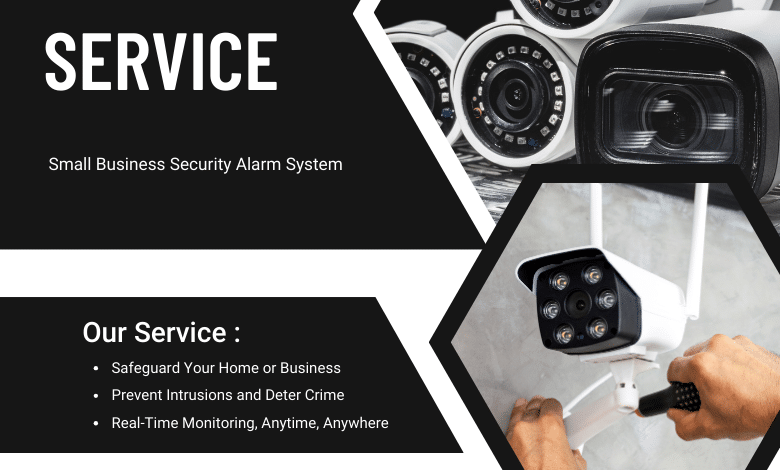Small Business Security Alarm System
Protect Your Small Business: How to Choose the Right Security Alarm System

Small Business Security Alarm System
In today’s fast-paced and ever-evolving world, protecting your small business is more important than ever. With the increasing threat of theft, vandalism, and other security breaches, it’s crucial to invest in a reliable security alarm system.
But with countless options available in the market, how do you choose the right one for your business? In this guide, we will walk you through the key factors to consider when selecting a security alarm system that meets your specific needs.
From assessing your business’s unique vulnerabilities to understanding the different types of alarm systems available, we’ll provide you with the knowledge and insights necessary to make an informed decision.
Discover how to protect your assets, employees, and customers with a security alarm system that combines cutting-edge technology with ease of use.
Don’t wait until it’s too late – safeguard your small business today and gain peace of mind knowing that you’ve taken the necessary steps to ensure its security.
The importance of security alarm systems for small businesses
As a small business owner, you understand the value of your assets, employees, and customers. Protecting them should be a top priority. Security alarm systems play a crucial role in safeguarding your business from potential threats. These systems act as a deterrent to would-be criminals and provide an early warning system in case of any security breaches. By investing in a reliable security alarm system, you not only protect your physical assets but also create a safe environment for your employees and customers to thrive. In today’s competitive landscape, a security alarm system is a necessity rather than a luxury for small businesses. It gives you a competitive edge by instilling confidence in your stakeholders and ensuring the continuity of your operations. With a security alarm system in place, you can focus on growing your business without worrying about security risks.
Types of security alarm systems available
When it comes to security alarm systems, there are various types to choose from. Each type offers unique features and benefits, catering to different business needs. Let’s explore some of the most common security alarm systems available in the market :
1. Burglar alarms:
Burglar alarms are designed to detect unauthorized entry into your premises. These alarms typically consist of sensors placed on doors and windows, which trigger an alarm when tampered with. Some advanced burglar alarms also include motion sensors and video surveillance capabilities for enhanced security.
2. Fire alarms:
Fire alarms are essential for protecting your business from the devastating effects of fire. These alarms detect smoke, heat, or flames and quickly alert you and the authorities, allowing for timely evacuation and fire suppression. Fire alarms are especially crucial for businesses that deal with flammable materials or operate in high-risk environments.
3. Surveillance systems: Surveillance systems, also known as CCTV (Closed-Circuit Television) systems, provide round-the-clock monitoring of your premises. These systems use cameras strategically placed throughout your property to capture video footage, which can be viewed in real time or recorded for later review. Surveillance systems act as a deterrent to potential criminals and provide valuable evidence in case of any security incidents. They are particularly useful for businesses that require constant monitoring, such as retail stores or warehouses.
4. Access control systems: Access control systems regulate who can enter your premises by requiring authorized credentials, such as key cards, biometric scans, or PIN codes. These systems offer a higher level of security by restricting access to specific areas within your business. Access control systems are commonly used in office buildings, healthcare facilities, and other businesses that need to protect sensitive information or valuable assets.
Choosing the right type of security alarm system depends on your business’s unique needs and vulnerabilities. Consider factors such as the size and layout of your premises, the nature of your business, and any specific security requirements you may have. By understanding the different types of security alarm systems available, you can make an informed decision that aligns with your business objectives.
Factors to consider when choosing a security alarm system
Selecting the right security alarm system for your small business requires careful consideration of various factors. By evaluating these factors, you can ensure that the system you choose meets your specific needs and provides optimal security. Here are some key factors to consider:
1. Risk assessment:
Start by conducting a thorough risk assessment of your business. Identify potential security threats, vulnerabilities, and areas of concern. Assess factors such as the location of your business, the crime rate in the area, and any previous security incidents you may have experienced. This assessment will help you determine the level of security you require and the specific features you should look for in a security alarm system.
2. Scalability:
As a small business, you have the growth potential. Consider whether the security alarm system you choose can accommodate your future expansion plans. It should be scalable enough to support additional sensors, cameras, or access control devices as your business grows.
3. Integration capabilities: Your security alarm system should seamlessly integrate with other security measures you have in place, such as surveillance cameras, access control systems, or security guards. Integration allows for a comprehensive security solution that maximizes efficiency and effectiveness.
4. Remote monitoring: In today’s digital age, remote monitoring is a valuable feature to have in a security alarm system. It enables you to monitor and control your system from anywhere, using your smartphone or computer. This feature provides convenience and peace of mind, as you can stay connected to your business’s security even when you’re not physically present.
5. Ease of use: A security alarm system should be easy to use and manage, even for those without technical expertise. Consider the user interface, accessibility of controls, and the availability of customer support when evaluating different systems.
6. Reliability and durability: Look for a security alarm system that is reliable and built to withstand various environmental conditions. It should be able to operate consistently and withstand any attempts at tampering or sabotage.
7. Cost-effectiveness: While cost should not be the sole determining factor, it’s important to consider your budget when choosing a security alarm system. Evaluate the upfront costs, ongoing maintenance expenses, and any additional fees associated with the system. Remember that investing in a reliable and high-quality system is a long-term investment in your business’s security.
By considering these factors, you can narrow down your options and choose a security alarm system that aligns with your business’s needs and budget. Remember that every business is unique, and what works for one may not work for another. Take the time to evaluate your specific requirements and consult with security professionals or reputable vendors to make an informed decision.
Assessing your small business’s security needs
Before selecting a security alarm system, it’s essential to assess your small business’s specific security needs. By understanding your vulnerabilities and requirements, you can choose a system that effectively addresses those needs. Here’s a step-by-step approach to assessing your security needs:
1. Identify potential threats:
Start by identifying the potential threats your business may face. This could include theft, vandalism, unauthorized access, fire, or other security breaches. Consider the specific risks associated with your industry, location, and operations.
2. Evaluate vulnerabilities: Once you’ve identified potential threats, evaluate the vulnerabilities within your business that could be exploited. Look for weaknesses in your physical security, access points, surveillance coverage, or alarm systems. Assess the effectiveness of your current security measures and identify any gaps that need to be addressed.
3. Consider regulatory requirements: Depending on your industry or location, there may be specific regulatory requirements you need to comply with. Research and understand the legal obligations related to security in your business. Ensure that the security alarm system you choose meets these requirements.
4. Consult with security professionals: If you’re unsure about assessing your security needs, consider consulting with security professionals or reputable vendors. They can conduct a thorough assessment of your business and provide expert recommendations based on their expertise and experience.
5. Involve stakeholders: It’s important to involve your key stakeholders, such as employees, managers, or security personnel, in the assessment process. They can provide valuable insights and perspectives that may not be apparent to you as the business owner. Their input will help ensure that the chosen security alarm system meets their needs as well.
By following this assessment process, you can gain a comprehensive understanding of your small business’s security needs. This knowledge will guide you in selecting a security alarm system that addresses your specific vulnerabilities and provides optimal protection.
Budget considerations for security alarm systems
Budget is an important factor when choosing a security alarm system for your small business. While it’s tempting to prioritize cost savings, it’s crucial to strike a balance between affordability and quality. Here are some budget considerations to keep in mind:
1. Total cost of ownership:
When evaluating different security alarm systems, consider the total cost of ownership over the system’s lifespan. This includes upfront costs, ongoing maintenance expenses, monitoring fees, and any additional charges. A system with a lower upfront cost may end up being more expensive in the long run if it requires frequent repairs or has high monitoring fees.
2. Return on investment: Look beyond the initial cost and consider the potential return on investment (ROI) of the security alarm system. A reliable and effective system can help prevent losses due to theft, vandalism, or other security incidents. Calculate the potential savings or revenue protection that the system can provide over time. This will help you justify the investment in a higher-quality system that may have a higher upfront cost.
3. Consider leasing options: If you have budget constraints, consider leasing a security alarm system instead of purchasing it outright. Leasing allows you to spread out the cost over a longer period, making it more manageable for small businesses with limited capital. However, carefully evaluate the terms and conditions of the lease agreement to ensure that it aligns with your needs and budget.
4. Avoid unnecessary features: While it’s important to choose a security alarm system that meets your specific needs, avoid unnecessary features that may drive up the cost. Evaluate each feature’s value and relevance to your business before making a decision. Focus on the core functionalities that provide the most significant security benefits.
By considering your budget and evaluating the long-term value of the security alarm system, you can make an informed decision that balances affordability with quality. Remember that investing in your business’s security is an essential aspect of protecting your assets and ensuring its long-term success.
Features to look for in a security alarm system
When selecting a security alarm system for your small business, it’s essential to look for specific features that provide optimal protection and ease of use.
Here are some key features to consider:
1. Security Alarm System 24/7 monitoring:
Choose a security alarm system that offers 24/7 monitoring by a professional security company.
This ensures that any security breaches are promptly detected and addressed, even when you’re not available to respond.
2. Mobile alerts:
Mobile alerts allow you to receive real-time notifications on your smartphone or other mobile devices. This feature keeps you informed about any security incidents or alarms triggered at your business premises, regardless of your physical location.
3. Backup power supply:
A power outage should not compromise the functionality of your security alarm system. Look for a system with a backup power supply, such as a battery backup or a generator, to ensure continuous protection.
4. Remote arming and disarming:
Remote arming and disarming capabilities allow you to control your security alarm system remotely. This feature provides convenience and flexibility, especially if you have multiple locations or frequently need to arm or disarm the system.
5. Video surveillance integration:
If you have or plan to install video surveillance cameras, choose a security alarm system that integrates seamlessly with them. This integration allows for synchronized monitoring and recording of video footage, providing a comprehensive security solution.
6. User-friendly interface:
The user interface of your security alarm system should be intuitive and easy to navigate. Look for systems with user-friendly interfaces that allow you to quickly access and manage the system’s settings and features.
7. Tamper-resistant design:
Ensure that the security alarm system you choose has a tamper-resistant design. It should be built to withstand physical tampering or attempts to disable the system. This feature adds an extra layer of protection against potential intruders.
By prioritizing these features and evaluating their relevance to your business, you can choose a security alarm system that meets your specific needs and provides optimal security. Remember that the right features will enhance the effectiveness and usability of your system, ensuring that you get the most out of your investment.
Choosing a reputable security alarm system provider
Selecting a reputable security alarm system provider is just as important as choosing the right system itself. A reliable provider will offer quality products, excellent customer service, and ongoing support. Here are some factors to consider when selecting a security alarm system provider:
1. Industry experience:
Look for providers with a proven track record in the security industry. Consider their experience in serving businesses similar to yours and their expertise in the specific type of security alarm system you require.
2. Reputation and reviews:
Research the provider’s reputation by reading customer reviews and testimonials. Look for feedback regarding the quality of their products, installation services, responsiveness, and overall customer satisfaction.
3. Certifications and licenses:
Ensure that the security alarm system provider is properly certified and licensed to operate in your area. This ensures that they adhere to industry standards and regulations, giving you peace of mind in their professionalism and expertise.
4. Comprehensive solutions:
Choose a provider that offers comprehensive security solutions beyond just the alarm system itself. Look for providers that can integrate additional security measures, such as surveillance cameras, access control systems, or fire alarms. This allows for a cohesive and integrated security solution that maximizes protection.
5. Customer support:
Evaluate the provider’s customer support offerings. Ensure that they offer timely and responsive support, especially in case of emergencies or system malfunctions. Consider the availability of technical assistance, troubleshooting, and maintenance services.
6. Long-term partnerships:
Look for providers that prioritize long-term relationships with their customers. This indicates their commitment to your business’s ongoing security needs. Consider providers that offer maintenance plans, regular system updates, and the option to upgrade or expand your system as your business grows.
By choosing a reputable security alarm system provider, you can rely on their expertise and support throughout the lifecycle of your system. This partnership ensures that your security needs are met consistently, and any issues are promptly addressed, leaving you with peace of mind



